
Democrats 66 is a social liberal political party in the Netherlands, which positions itself in the centre of the political spectrum. It is a member of the Liberal International (LI) and the Alliance of Liberals and Democrats for Europe (ALDE).
A minority government, minority cabinet, minority administration, or a minority parliament is a government and cabinet formed in a parliamentary system when a political party or coalition of parties does not have a majority of overall seats in the legislature. It is sworn into office, with or without the formal support of other parties, enabling a government to be formed. Under such a government, legislation can only be passed with the support or consent of enough other members of the legislature to provide a majority, encouraging multi-partisanship. In bicameral legislatures, the term relates to the situation in the chamber whose confidence is considered most crucial to the continuance in office of the government.

The prime minister of Denmark is the head of government in the Kingdom of Denmark comprising the three constituent countries: Denmark, Greenland and the Faroe Islands. Before the creation of the modern office, the kingdom did not initially have a head of government separate from its head of state, namely the monarch, in whom the executive authority was vested. The Constitution of 1849 established a constitutional monarchy by limiting the powers of the monarch and creating the office of premierminister. The inaugural holder of the office was Adam Wilhelm Moltke.
In British politics, a Lib–Lab pact is a working arrangement between the Liberal Democrats and the Labour Party.

In British parliamentary practice, the Official Opposition Shadow Cabinet consists of senior members of His Majesty's Loyal Opposition who scrutinise their corresponding government ministers, develop alternative policies, hold the government to account for its actions and responses, and act as spokespeople for the opposition party in their own specific policy areas. Since May 2010, the Labour Party has been the Official Opposition, and its leadership therefore forms the current shadow cabinet.
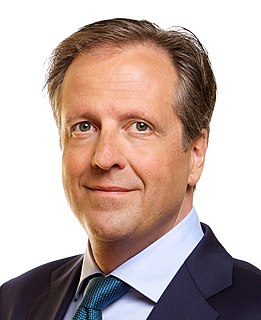
Alexander Pechtold is a retired Dutch politician and art historian. He is a member of Democrats 66.

The Government of Austria is the executive cabinet of the Republic of Austria. It consists of the chancellor, who is the head of government, the vice chancellor and the ministers.

The deputy prime minister of Sweden is the deputy head of government of Sweden. The incumbent deputy prime minister is Ebba Busch.

Gordon Brown formed the Brown ministry after being invited by Queen Elizabeth II to form a new administration following the resignation of the previous Prime Minister of the United Kingdom, Tony Blair, on 27 June 2007. Brown formed his government over the course of the next day, with Jacqui Smith being appointed the United Kingdom's first female Home Secretary.
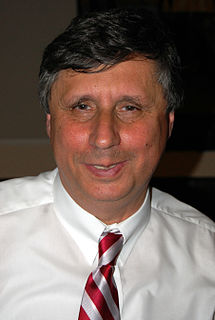
The Government of the Czech Republic, led by Prime Minister Jan Fischer, was a caretaker government established after Mirek Topolánek and his government lost confidence vote in the Chamber of Deputies.

The politics of Denmark take place within the framework of a parliamentary representative democracy, a constitutional monarchy and a decentralised unitary state in which the monarch of Denmark, Queen Margrethe II, is the head of state. Denmark is described as a nation state. Danish politics and governance are characterized by a common striving for broad consensus on important issues, within both the political community and society as a whole.
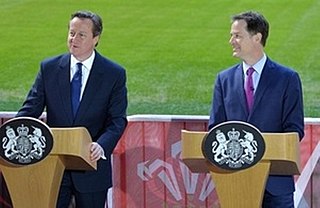
The Cameron–Clegg coalition was formed by David Cameron and Nick Clegg when Cameron was invited by Queen Elizabeth II to form a new administration, following the resignation of Prime Minister Gordon Brown on 11 May 2010, after the general election on 6 May. It was the UK's first coalition government since the Churchill caretaker ministry in 1945. The coalition was led by Cameron as Prime Minister with Clegg as Deputy Prime Minister and composed of members of both Cameron's centre-right Conservative Party and Clegg's centrist Liberal Democrats.
The list that follows is the Frontbench Team led by Nick Clegg from 2007 to 2010, before the Liberal Democrats and Conservatives formed a coalition government following the 2010 general election, and Clegg became Deputy Prime Minister.

The First Brandt cabinet was the government of Germany between 22 October 1969 and 15 December 1972, during the 6th legislature of the Bundestag. Led by the Social Democrat Willy Brandt, the cabinet was a coalition between the Social Democrats (SPD) and the Free Democratic Party (FDP). The Vice-Chancellor was the Free Democrat Walter Scheel (FDP).

The cabinet of Prime Minister Helle Thorning-Schmidt was the cabinet government of Denmark from 3 October 2011 to 3 February 2014. It was a coalition between the Social Democrats, the Danish Social Liberal Party and the Socialist People's Party. On 9 August 2013, Helle Thorning-Schmidt made a cabinet reshuffle and on 12 December 2013, she made a second cabinet reshuffle. The cabinet resigned on 3 February 2014, following the Socialist People's Party left the government on 30 January 2014. It was succeeded by the Cabinet of Helle Thorning-Schmidt II
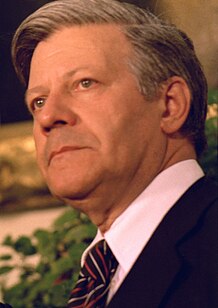
The Second Schmidt cabinet was the government of Germany between 16 December 1976 and 5 November 1980, during the 8th legislature of the Bundestag. Led by the Social Democrat Helmut Schmidt, the cabinet was a coalition between the Social Democrats (SDP) and the Free Democratic Party (FDP). The Vice-Chancellor was the Free Democrat Hans-Dietrich Genscher (FDP).
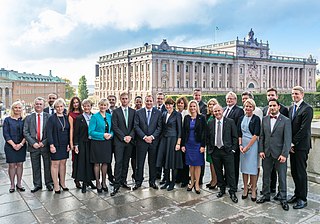
The first cabinet of Stefan Löfven was the cabinet of Sweden between 2014 and 2018. It was a coalition government, consisting of two parties: the Social Democrats and the Green Party. The cabinet was installed on 3 October 2014, following the 2014 general election. It lost a vote of no confidence following the 2018 election, but remained in office as a caretaker government. Löfven was reelected as Prime Minister in January 2019, thus forming the second cabinet of Stefan Löfven.

The D'Alema II Cabinet was the cabinet of the government of Italy from 22 December 1999 to 26 April 2000.

The second cabinet of Kaja Kallas is the incumbent cabinet of Estonia.

The Kristersson Cabinet is the 57th Government of Sweden and is formed by Ulf Kristersson, leader of Moderate Party. It is a coalition government consisting of three parties: the Moderate Party, the Christian Democrats, and the Liberals. The cabinet works closely with the Sweden Democrats, in accordance with the Tidö Agreement.


















